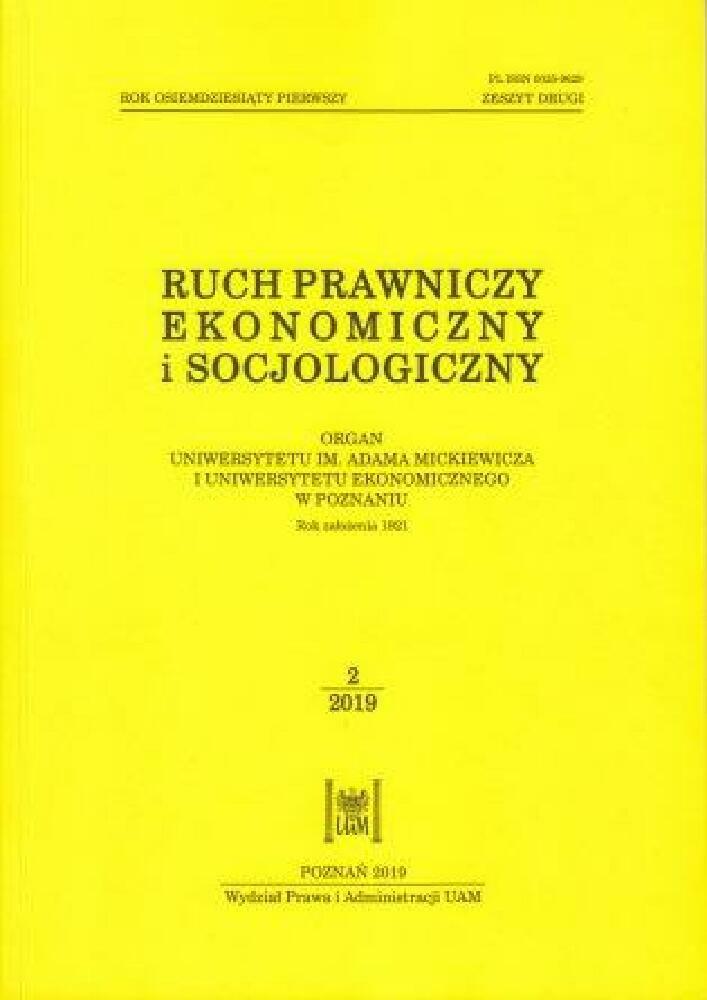Abstract
The starting point of the author’s considerations is one of Cicero’s forensic speeches in a civil case, Oratio pro Caecina. But the main purpose of this article is to answer the following question: was Cicero a jurist or not? For many years, this problem was controversial for Romanists, historians and theoreticians of rhetoric. The author puts forward two hypotheses – firstly, a historical one, and secondly a modern one. In the light of the former, Cicero was not a jurist, because in court he played the role of a Roman advocatus and Roman iurisconsultus. From the modern perspective the problem is more complicated – he was a jurist in the modern sense, even if he was not a jurist in today’s meaning. The author’s analysis is constructed more from the point of view of legal philosophy than from the history of Roman law.References
Berlin, I. (1993). Jeż i lis. Tłum. A. Komarek, H. Krzeczkowski, K. Tarnowska. Warszawa.
Birks, P. (1987). The rise of the Roman jurists. Oxford Journal of Legal Studies 7(3): 444–453.
Burczak, K., Dembiński, A., Jońca, M. (2018). Łacińskie sentencje i powiedzenia prawnicze. Wyd. 3. Warszawa.
Cotterrell, R. (2013). The role of the jurist: reflections around Radbruch. Ratio Juris 26(4): 510–522.
Crook, J.A. (1995). Legal Advocacy in the Roman World. Ithaca, NY.
Cyceron (2003). Mowy. Tłum. S. Kołodziejczyk, J. Mrukówna, D. Turkowska. Kęty.
Dajczak, W., Giaro, T., Longachamps de Bérier, F. (2014). Prawo rzymskie. U podstaw prawa prywatnego. Wyd. 2. Warszawa.
Dembiński, A., Jońca, N. (red.) (2016). Leksykon tradycji rzymskiego prawa prywatnego. Warszawa.
Dworkin, R. (2011). Justice for Hedgehogs. Cambridge, MA–London.
Frier, B.W. (1985). The Rise of the Roman Jurists: Studies in Cicero’s Pro Caecina. Princeton.
Frier, B.W. (1989). Autonomy of law and the origins of the legal profession. Cardozo Law Review 11: 259–286.
Gordley, J. (2013). The Jurists: A Critical History. Oxford.
Harris, R. (2018). Dyktator. Tłum. A. Szulc. Warszawa.
Harries, J. (2006). Cicero and the Jurists: From Citizens’ Law to the Lawful State. London.
Honoré, T. (2002). Ulpian: Pioneer of Human Rights. Wyd. 2. Oxford.
Honsell, H., Mayer-Maly Th.(2015). Rechtswissenschaft. Eine Einführung in das Recht und seine Grundlagen. Wyd. 6. Berlin–Heidelberg.
Kubiak, P. (2015). Kilka uwag na temat znajomości prawa u mówców sądowych republikańskiego Rzymu. Krakowskie Studia z Historii Państwa i Prawa 8(1): 1–24.
Kumaniecki, K. (1989). Cyceron i jego współcześni. Warszawa.
Lintott, A. (2008). Cicero as Evidence: A Historian’s Companion. Oxford.
Litewski, W. (2000). Jurysprudencja rzymska. Kraków.
Litewski, W. (2001). Podstawowe wartości prawa rzymskiego. Kraków.
Lučić, Z. (2010). Cicero als Jurist und Theoretiker. Annales FLB – Belgrad Law Review 58(3): 137–150.
Łyczywek, R. (1960). M. T. Cicero – adwokat rzymski. Palestra 4/9(33): 75–91.
Michalunio SJ, C. (2008). Dicta editio maior. Zbiór łacińskich sentencji, przysłów, zwrotów, powiedzeń. Kraków.
Plessis, P.J. du (ed.) (2013). New Frontiers: Law and Society in the Roman World. Edinburgh.
Plessis, P.J. du (ed.) (2016). Cicero’s Law: Rethinking Roman Law of the Late Republic. Edinburgh.
Powell, J., Paterson, J. (eds.) (2004). Cicero the Advocate. Oxford.
Remete, M. (2018). An analysis of Cicero’s Pro Caecina: Piso’s argumet viewed from a statutory interpretation perspective. Revista Juridica de Unversidad de SanAndres 6: 1–24.
Riggsby, A.M. (2010). Roman Law and the Legal World of the Romans. New York.
Rozwadowski, W. (1986), Advocatus, [w:] W. Wołodkiewicz (red.), Prawo rzymskie. Słownik encyklopedyczny. Warszawa: 20.
Stelmach, J., Brożek, B. (2006). Metody prawnicze. Logika – analiza – argumentacja – hermeneutyka. Wyd. 2. Warszawa.
Stroh, W. (1975). Taxis und Taktik. Die advokatische Dispositionskunst in Ciceros Gerichtsreden. Stuttgart.
Stroh, W. (2008). Cicero. Redner, Staatsmann, Philosoph. München.
Stroux, J. (1926). Summum ius summa iniuria. Ein Kapitel aus der Geschichte der interpretatio iuris. Leipzig.
Tellegen-Couperus, O. (2008). Cicero and Ulpian: two paragons of legal practice. Revue Internationale des Droits de l’Antiquité 55: 485–497.
Tellegen-Couperus, O., Tellegen, J.W. (2000). Law and rhetoric in causa Curiana. Orbis Iuris Romani – Journal of Ancient Law Studies 6: 171–202.
Tellegen-Couperus, O., Tellegen, J.W. (2006). Nihil hoc ad ius, ad Ciceronem. Revue Internationale des Droits de l’Antiquité 53: 381–408.
Waśkiewicz, H. (1960). ‘De legibus’ Cicerona – pierwszy w dziejach myśli europejskiej system filozoficzno-prawny. Roczniki Filozoficzne KUL 8(2): 39–52.
Watson, A. (1987). The birth of the legal profession. Michigan Law Review 85(5/6): 1071–1082.
Watson, A. (1995). The Spirit of Roman Law. Athens, GA.
Wołodkiewicz, W. (red.) (1986). Prawo rzymskie. Słownik encyklopedyczny. Warszawa.
Wołodkiewicz, W. (red.) (2010). Regulae iuris. Łacińskie inskrypcje na kolumnach Sądu Najwyższego Rzeczypospolitej Polskiej. Wyd 3. Warszawa.
Zajadło, J. (2007). Dziedzictwo przeszłości. Gustaw Radbruch: portret filozofa, prawnika, polityka i humanisty. Gdańsk.
Zorić, V. (2012). Banished with no force exile and metonymy in Cicero’s Pro Caecina Oratio. Diacritics 40(4): 72–103.
Zybała, D. (2016). Advocatus, [w:] A. Dembiński, M. Jońca (red.), Leksykon tradycji rzymskiego prawa prywatnego. Warszawa: 18.
Zyl, D.H. van (1990). Cicero’s eclecticism and originality. Akroterion – Journal for the Classics in South Africa 35(3–4): 118–122.
License
Copyright (c) 2019 WPiA UAM

This work is licensed under a Creative Commons Attribution-NonCommercial-NoDerivatives 4.0 International License.





